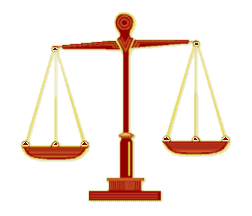Defense (legal) facts for kids
In legal cases, a defense is like an answer or an explanation given by someone who is accused of doing something wrong. This person is called the defendant. They use a defense to try and show they are not responsible for what they are accused of. It's their way of saying, "Here's why I shouldn't be blamed."
This idea applies in different types of legal situations. For example, in a civil case, where one person sues another, the defendant uses a defense to explain why they don't owe money or shouldn't be held responsible. It's also used when someone is accused of breaking a rule or a law.
Understanding Legal Defenses
When a person faces a legal problem, they have the right to defend themselves. A defense is not just saying "I didn't do it." It's often a specific legal reason or argument that helps the defendant. These reasons can show that:
- The accusation is not true.
- The defendant was not at fault.
- There's a good reason why they acted the way they did.
- The legal rules were not followed correctly.
Common Ways to Defend a Case
There are many ways a defendant can try to avoid being held responsible. Here are some common types of defenses:
- Lack of court power: Sometimes, a defendant might argue that the court itself doesn't have the power or "jurisdiction" to hear their case. An example is diplomatic immunity, where certain diplomats cannot be sued in the country they are working in.
- Missing information: A defense can also be that the other side (the plaintiff or accuser) didn't provide enough information or a clear reason for their accusation.
- Special legal reasons: There are specific legal defenses that, if proven, can completely change the outcome of a case. These are called affirmative defenses.
- Time limits: Laws often have time limits for bringing a case. If too much time has passed, a defendant can use a statute of limitations as a defense. This means the case was started too late.
- Consent: In some situations, a defense might be that the other person agreed to what happened. For example, if someone willingly participates in a sport and gets injured, they might have "consented" to the risk. This is known as Volenti non fit injuria.
- Both at fault: Sometimes, both sides in a dispute might be equally responsible for the problem. This can also be a defense, called In pari delicto.
Related Legal Ideas
Understanding defenses helps us learn more about how the legal system works. Here are some other important ideas:
- Lawsuit: This is a legal action where one person or group sues another in a civil court.
- Presumption of innocence: This is a very important idea in law. It means that a person accused of something is considered innocent until proven guilty. The burden is on the accuser to show guilt, not on the defendant to prove innocence.
- Adversarial system: This is the legal system used in many countries, including those based on English law. It means two sides (the accuser and the defendant) present their arguments to a judge or jury, who then decide the outcome.
See also
 In Spanish: Defensa (derecho) para niños
In Spanish: Defensa (derecho) para niños
 | William M. Jackson |
 | Juan E. Gilbert |
 | Neil deGrasse Tyson |


